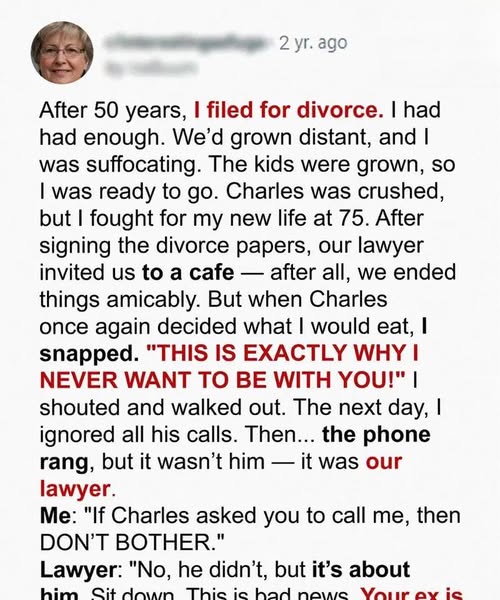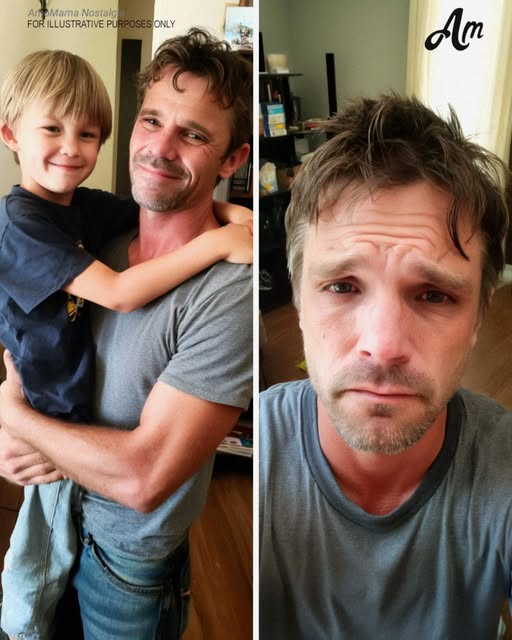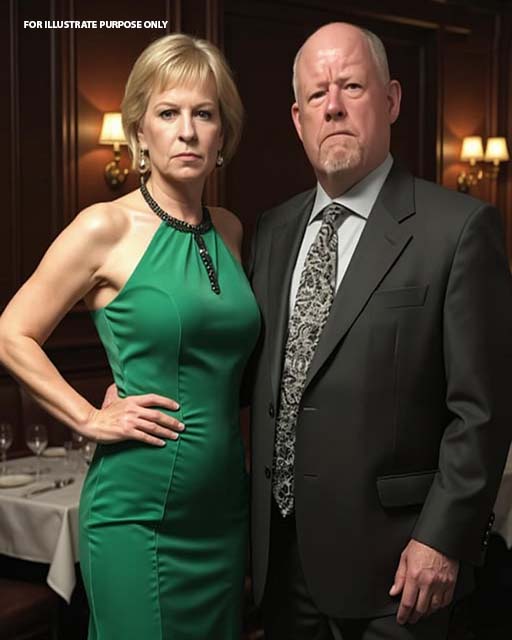We signed the papers in the morning—fifty years dissolved in a few strokes of a pen—and our lawyer suggested coffee to mark the end of something we’d once believed would never end. It was civil, almost gentle, until the menus arrived and Charles, out of pure habit, told the waiter what I’d have.
Something inside me tore.
“This is exactly why I never want to be with you,” I said, louder than I meant to, and walked straight out into the bright, indifferent day.
I ignored his calls all night. The phone finally rang again, and I snapped before I could help myself. “If he asked you to call me—”
“It’s not that,” our lawyer said softly. “He collapsed after you left. A stroke. He’s in the ICU.”
I was out the door before the call ended.
Twenty minutes later, fluorescent lights and antiseptic air. He looked small in that bed, pale and adrift, with machines breathing measured metronomes at his side. Priya—my stepdaughter—stood guard, mascara smudged. “I didn’t know who else to call,” she whispered.
I sat with him. I came back the next day, and the next. Not because I owed him, but because something in me opened—a quiet ache where the anger had been. I rubbed lotion into his hands like I had for decades, read aloud from the paper, filled the silence with the ordinary details of a shared life. I told him the truth, too.
“I left because I couldn’t breathe, Charles. You didn’t listen. I stopped talking. That’s on both of us.”
On the sixth day, while I was clowning through the classifieds—“Roommate wanted, must enjoy jazz and too much garlic; sounds like your type”—he made a sound. A thin groan. His eyes shifted under heavy lids, then found me.
“Mina?”
“It’s me.”
“I thought you were done with me.”
“I was,” I said. “That doesn’t mean I stopped caring.”
He managed a crooked smile. “Figures you’d come back when I’m helpless.”
“Always were a little dramatic,” I said, laughing through tears.
Recovery was slow: rehab, relearning, a stubborn march back to himself. We talked more in those months than we had in ten years. Not autopsies of the past—just the quiet spaces we’d ignored. He confessed he never realized how much I did until I wasn’t beside him. I admitted I hadn’t realized how much of myself I’d given away until I left. There was no triumph in it, just relief.
Right before discharge, Priya pulled me aside. “There’s something you should know. A few weeks before the stroke, he changed things. The will. The accounts. Most of it is still in your name.”
“That doesn’t make any sense.”
She shrugged helplessly. “He said, ‘No matter how angry she is, she’s still my Mina.’ I told him he was crazy. He didn’t care.”
I asked him about it the next day.
“I wanted you to have something,” he said, eyes on the window. “Proof I cared, even if I was late to show it.”
“It’s not about the money.”
“I know. I guessed you’d refuse. Predictable woman.”
We both laughed. I did refuse. Instead, we asked what it could become. Slowly, an idea bloomed: a scholarship for women like me—older, starting over, finally choosing themselves. We called it the Second Bloom Fund: tuition for women returning to school after sixty. For once, purpose put color back in his face. We set it up together. We held the first awards ceremony in spring.
We never remarried. That chapter had closed. We wrote a different ending: a friendship with soft edges, a weekly lunch where I ordered my own damn food, banter that didn’t bruise. The kids were puzzled, then relieved. No grand reunion—just two stubborn people learning how to be kind to each other again.
The strangest, loveliest part was falling in love again—not with him, but with myself. I moved into a small condo, took a part-time job at the community center library, destroyed and replanted a garden twice, learned how to fix my own sink. Seventy-six felt brand-new.
He died three years later, quiet as a closing book. I was holding his hand. At the funeral, Priya gave me a letter he’d left.
“If you’re reading this, I’m gone,” he’d written. “Thank you for coming back—not to stay, just to sit with me a little longer. You taught me to listen when it was too late to fix it, and to let go with grace. I hope the rest of your life is exactly what you want.” He signed it: “Still a little bossy, but always yours, Charles.”
Every year on his birthday, I sit in the garden behind the community center—built with what was left after our first scholarship round—and tell him the gossip he would’ve loved: who eloped, which tomato variety finally behaved, which Second Bloom scholar just finished her degree. The bench with his name warms under the sun. I sit, and I am not sad.
I thought closure would be a slammed door. It turned out to be a quiet chair beside a hospital bed and the soft click of a pen signing a check for a woman who’s two years older than I am and ready to start again. Endings don’t have to be bitter to be final. Sometimes you leave, sometimes you stay for a while, and sometimes you come back just long enough to say the things that make beginning again possible.




